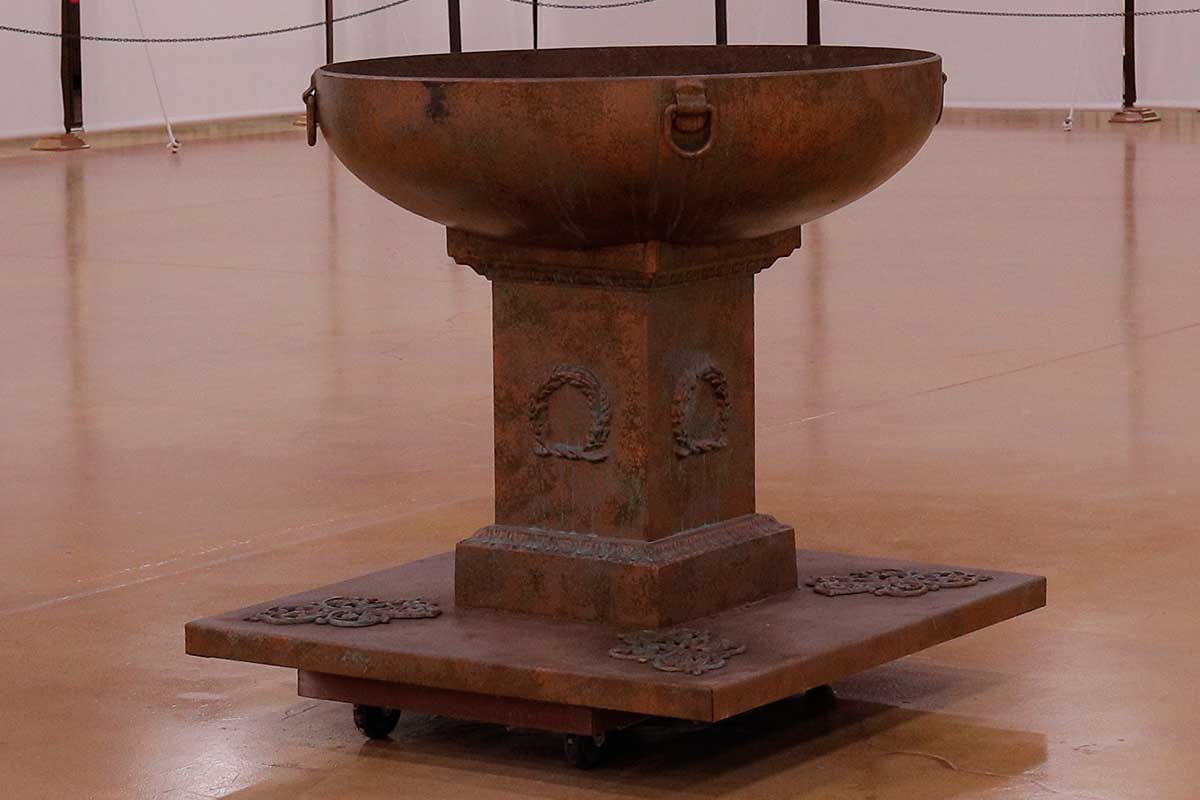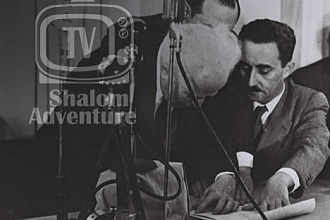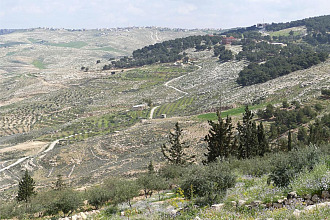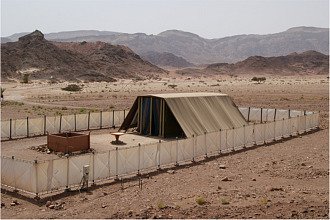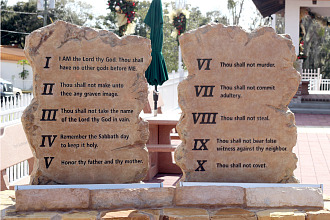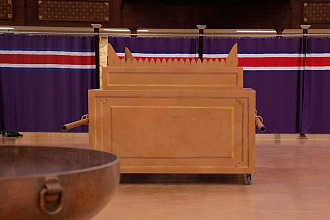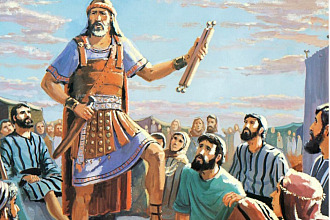Parasha for the Week: Ki-Tasa: Exodus 30:11 – 34:35.
Haftarah for the Week: 1 Kings 18:1 – 39.
Besorat Yeshua: Mark 15:28 – 41.
Overview
A census is done by counting each silver half-shekel donated by all men age twenty and over.
Moshe is commanded to make a copper laver for the Mishkan. The women donate the metal.
The formula of the anointing oil is specified, and G-d instructs Moshe to use this oil only for dedicating the Mishkan, its vessels, Aharon, and his sons.
G-d selects Bezalel and Oholiav as master craftsmen for the Mishkan and its vessels.
The people of Israel are commanded to keep the Sabbath as an eternal sign that G-d is Creator. Moshe receives the two Tablets of Testimony on which are written the Ten Commandments.
The mixed multitude who left Egypt with the Jewish People panic when Moshe's descent seems delayed, and convince Aharon to make a golden calf for them to worship.
G-d tells Moshe to return to the people immediately, threatening to destroy everyone and build a new nation from Moshe. When Moshe sees the camp of idol-worship he smashes the tablets and destroys the golden calf. The sons of Levi punish the transgressors, executing 3,000 men. Moshe ascends the mountain to intercede for forgiveness for the people. G-d accepts his prayer.
Moshe sets up the Mishkan and G-d's cloud of glory returns. G-d tells Moshe to hew new tablets for God to rewrite the commandments upon.
Idol worship, intermarriage and boiling a café in its mother’s milk are prohibited. The laws of Pesach, the first-born, the first-fruits, Shabbat, Shavuot, and Succot are taught.
Moshe descends with the second set of tablets; his face is luminous from contact with the Divine.
A Shabbat of Complete Rest
The Torah states, "Six days you shall work and on the seventh day, it should be a complete rest sacred to the Almighty" (Exodus 31:15).
Love For Wisdom
The Torah states, "And in the heart of each person who had a wise heart I have given wisdom" (Exodus 31:6). Why does the Torah make having a wise heart a prerequisite for the Almighty granting wisdom? Rabbi Chaim Shmuelevitz, Rosh Hayeshiva, teaches that from here we see that a person needs wisdom to merit acquiring wisdom. What is this wisdom? It is the heartfelt desire for more wisdom! We can have a picture of what this desire is from the desire of Haman (in the Purim story) for honor. He was second to the king in power and the entire population of 127 countries bowed to him. Nevertheless, when Mordechai refused to bow down to him, he said that all his honor was as nothing since he was missing one person's honor. So, too, a person who has a deep love of wisdom feels a strong lack for any wisdom he is missing. When you have this love for wisdom, the Almighty will give you greater wisdom!
One of the Purposes of the Copper Basin
To show the carefulness they were to observe in regard to being clean, Moses was to put a laver between the tent of the congregation and the altar, "and put water therein to wash withal." Moses, Aaron, and Aaron's sons that ministered before the Lord, were to wash their hands and their feet there when they went into the tent of the congregation, and when they went in before the Lord. Here was the commandment of the great and mighty God. . . . The reason is that a right impression might be made upon the people. . . . If the priests showed great reverence for God, by being very careful and very particular as they came into His presence, it gave the people an exalted idea of God and his requirements. It showed them that God was holy, that His work was sacred, and that everything in connection with the work of God must be holy; that it must be free from everything like impurity and uncleanliness; and that all defilement must be put away from those that approach nigh to God" (Patriarchs and Prophets, p. 350; Review and Herald, May 30, 1871, par. 10).
Haftarah: 1 Kings 18:1 - 39
Parasha: Israel experienced a great apostasy at Mt Sinai. “He took what they handed him and made it into an idol cast in the shape of a calf, fashioning it with a tool. Then they said, ‘These are your gods, O Israel, who brought you up out of Egypt’” (Exodus 32:4).
Haftarah: Israel experienced a great apostasy at Mt. Carmel: “they took the bull given them and prepared it. Then they called on the name of Baal from morning till noon. ‘O Baal, answer us!’ they shouted. But there was no response; no one answered. And they danced around the altar they had made” (1Kings 18:26). During this time King Ahab accuses Elijah as the troubler of Israel: “When he saw Elijah, he said to him, ‘Is that you, you troubler of Israel?’” (1Kings 18:17) Ahab is the one who brought idolatry to Israel, but he is so blind that he does not see any more where the problem is. Elijah does not hesitate to say the truth to the king “But you and your father's family have. You have abandoned the LORD's commands and have followed the Baal’s” (1Kings 18:17). Elijah is a courageous man, even if later he will be afraid to be killed by Jezebel. It is this sort of man and woman the world needs. “Would that every one might realize the sacredness of his position and the holiness of his work, and show the courage that Elijah showed! As believers we are in a position of awful responsibility” (Prophets and Kings, p. 149).
Besorat Yeshua Mark 15:28 - 41
Haftarah: Israel experienced a great apostasy in the time of Elijah.
Besorah: Israel experienced a great apostasy in the time of Yeshua: “In the same way the chief priests and the teachers of the law mocked him among themselves. ‘He saved others,’ they said, ‘but he can't save himself!’”(Mark 15:29-31) The text of the Besorah has a clear link to the text of the Haftara, which is about Elijah. Yeshua says on the cross “Eloi, Eloi, lama sabachthani?” (Mark 15:34) Some people have not heard very well what he said: When some of those standing near heard this, they said, “Listen, he's calling Elijah” (Mark 15:34). The Jewish people were waiting for the coming of Elijah just before the coming of the Messiah (Malachi 4:5). The four gospels mention the name of Elijah contain twenty-six times. For Yeshua, Yochanan Hamatbil (John the Immerser) was Elijah: “And if you are willing to accept it, he is the Elijah who was to come” (Matthew. 11:14). Later He said: “But I tell you, Elijah has already come, and they did not recognize him” (Matthew. 17:12). Yochanan had the same courageous attitude of Elijah, he did not hesitate to speak the truth to King Herod. “For Yochanan had been saying to Herod, ‘It is not lawful for you to have your brother's wife’” (Mark 6:18). Herod killed Yochanan. However, his mission, to prepare the coming of the Messiah, was fulfilled.

